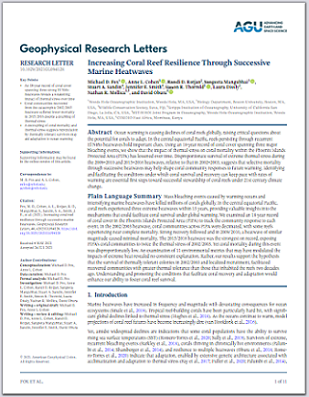
Ocean warming is causing declines of coral reefs globally, raising critical questions about the potential for corals to adapt. In the central equatorial Pacific, reefs persisting through recurrent El Niño heatwaves hold important clues. Using an 18-year record of coral cover spanning three major bleaching events, we show that the impact of thermal stress on coral mortality within the Phoenix Island Protected Area (PIPA) has lessened over time. Disproportionate survival of extreme thermal stress during the 2009–2010 and 2015–2016 heatwaves, relative to that in 2002–2003, suggests that selective mortality through successive heatwaves may help shape coral community responses to future warming. Identifying and facilitating the conditions under which coral survival and recovery can keep pace with rates of warming are essential first steps toward successful stewardship of coral reefs under 21st century climate change.














